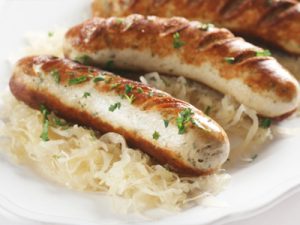
October in San Diego, without the change of seasons and colorful foliage usually associated with autumn, can mean only one thing – Oktoberfest! The celebration of all things German. A time for consuming cold beer and grilled sausages to the accompaniment of a polka band.
Germans love their meat and, on average, consume 134 pounds of meat every year. Meals are often centered around pork, beef and poultry, with pork being the most popular protein source. Meats are typically braised, which means they’re seared quickly at a high temperature before being simmered slowly in a broth or other liquid. Other signature dishes, such as sauerbraten, or “sour roast”, involve tougher cuts of meat that have been marinated for hours in wine or vinegar and spices. And, as evidenced by more than 1,500 varieties of wurst, there is a long-history of sausage making.
Which brings me to a bit of Bavaria found in Ocean Beach.
Since 1980, and at their current location since 1992, Kaiserhof, 2253 Sunset Cliffs Blvd., has garnered a well-deserved reputation for serving the best German food in San Diego. I recently visited the iconic restaurant with my assistant, Wingman. I thought Wingman would be a good point of reference because he had lived in Berlin for a while. Although meeting him for dinner means withstanding a snarknado*, he sometimes has positive things to say, too.
We were seated quickly at our linen-topped table in the dining room – there was barely enough time to admire the numerous accolades adorning the walls of the entryway. The wainscot, beamed ceilings, etched glass windows and large paintings of castles on the walls, exuded Old World charm. Warm dinner rolls with a flaky crust and tender crumb appeared with pats of butter.
We began with the wurst sampler. I don’t know which of the grilled sausages I preferred; the bauerwurst, a coarse sausage with hints of mustard seed and marjoram, and a smoky flavor reminiscent of bacon, or the bratwurst, a tender well-balanced blend of pork and veal, mildly seasoned with a whisper of licorice-y tarragon. Both were delicious.
I ordered the cucumber salad, a tart blend of thin cucumber slices, pickled onion, vinegar, dill and a kiss of sugar, while Wingman ordered a cup of the beef consommé, a rich full-bodied broth. Our entrées were the schnitzel and rostbraten. There is always a danger of overcooking thin cuts of meat, but our selections were tender and well rendered. The lightly seasoned schnitzel, a breaded veal cutlet dipped in egg, breaded with flour, then sautéed in butter, was accompanied by slices of lemon, while the rostbraten, a pan-seared New York steak, was served with au jus and caramelized onions. Crisp fried potatoes and firm buttery spatzle, a type of egg noodle, were our sides.
Dessert brought a sweet ending to the entire affair. The hot apple strudel contained diced apples, raisins, and slivered almonds, combined with just the right amount of sugar and cinnamon, baked in a flaky golden-brown dough.
The portions were generous, too. We left carrying doggy bags and the next day’s lunch. As we drove home, I asked my friend what he thought of the meal? Wingman, in an unguarded moment of sincerity, said his dinner was “the closest to authentic German food” he had tasted since living in Berlin.
I think that means he liked it.
* snark-na-do, noun, a combination of “snide”, “remark” and “tornado”. Extremely sarcastic comments over an extended period of time. “Her snarknado left everybody’s reputation in ruins.”











